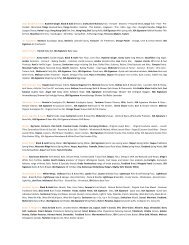World Development Report 1984
World Development Report 1984
World Development Report 1984
You also want an ePaper? Increase the reach of your titles
YUMPU automatically turns print PDFs into web optimized ePapers that Google loves.
Foreword<br />
This <strong>Report</strong> is the seventh in this annual series that governments and their peoples have a wide<br />
assessing development issues. This year the focus range of views on this subject.<br />
is on population change and its links with develop- Even with success in efforts to slow population<br />
ment. Population growth does not provide the growth, future population growth will still be<br />
drama of financial crisis or political upheaval, but heavily concentrated in what are now the poorer<br />
as this <strong>Report</strong> shows, its significance for shaping areas of the globe. Thus the average level of<br />
the world of our children and grandchildren is at human welfare will depend largely on the degree<br />
least as great. What governments and their peo- of economic and social transformation in those<br />
ples do today to influence our demographic future areas. The poverty of those areas cannot be blamed<br />
will set the terms for development strategy well on rapid population growth alone; the causes of<br />
into the next century. Failure to act now to slow poverty go well beyond population change. Nor<br />
growth is likely to mean a lower quality of life for will reducing population growth alone ensure their<br />
millions of people. In the poorest countries of the economic transformation. But this <strong>Report</strong> shows<br />
world, and among the poorest groups within that slowing the pace of population growth can<br />
countries, poverty contributes to high mortality make a difference-and that the ingredients for<br />
and even higher fertility. It thereby creates a doing so are also those that will increase economic<br />
vicious circle: the slow pace at which development growth.<br />
reaches the poor contributes to rapid population The analysis of the population situation follows<br />
growth, making the elimination of poverty increas- our annual review of global economic developingly<br />
difficult. Slowing population growth is a dif- ments, which as in previous years occupies the<br />
ficult challenge to humanity-but a challenge that first part of the <strong>World</strong> <strong>Development</strong> <strong>Report</strong>. It might<br />
must and can be successfully addressed. be argued that the general public remains insuffi-<br />
On the one hand, the situation is grave: this ciently aware of the growing links among nations<br />
<strong>Report</strong> concludes that in some countries develop- over the past few decades, and of the extent today<br />
ment may not be possible at all unless slower pop- of international economic interdependence. In an<br />
ulation growth can be achieved soon, before increasingly interdependent world, low growth,<br />
higher real incomes would bring fertility down fiscal and labor market problems, and resulting<br />
spontaneously. On the other hand, there is reason inflation in industrial countries have taken a heavy<br />
for hope: the experience of the past decade shows toll in developing countries. Exports have sufthat<br />
education, health, and other development fered, fear of protectionism has increased, and<br />
measures that raise parents' hopes for their chil- high real interest rates have made debt servicing a<br />
dren, along with widespread access to family plan- costly burden. If the industrial countries fail to<br />
ning services, create a powerful combination in regain the growth rates they managed in the 1950s<br />
reducing fertility. and 1960s, many countries in the developing<br />
The discussion of population places special world will have great difficulty making progress in<br />
emphasis on the role of public policy in an area the years ahead. Indeed, the prospects for much of<br />
where fundamental human values are at stake. sub-Saharan Africa will be particularly grave.<br />
Population is a subject that touches issues central But it is also apparent that even in a harsh interto<br />
the human condition, including personal free- national climate, the developing nations can take<br />
dom and the very definition of economic and social actions to improve their own economic perforprogress.<br />
This <strong>Report</strong> tries to do it full justice, in a mance. Developing countries share the problems<br />
sensitive and thought-provoking way, recognizing of the developed, from fiscal deficits to distorted<br />
iii









